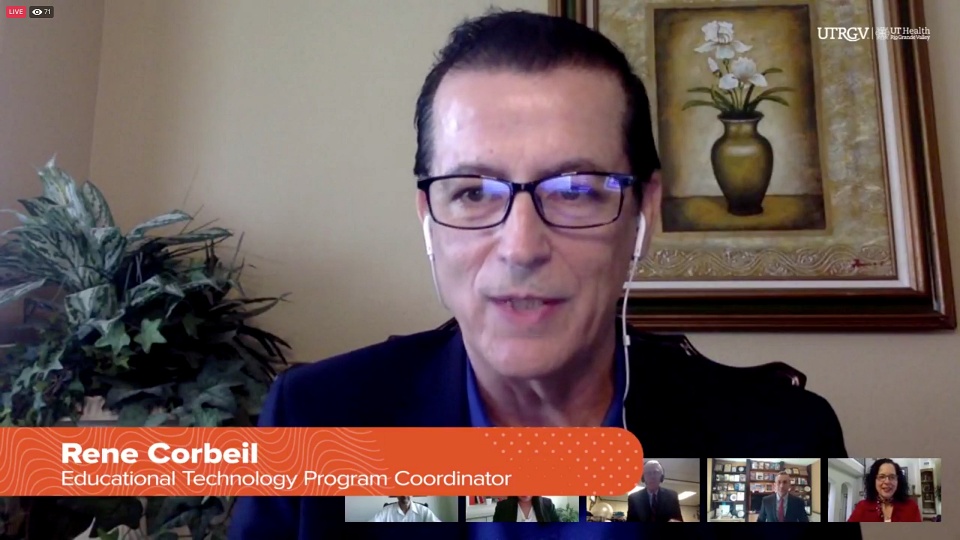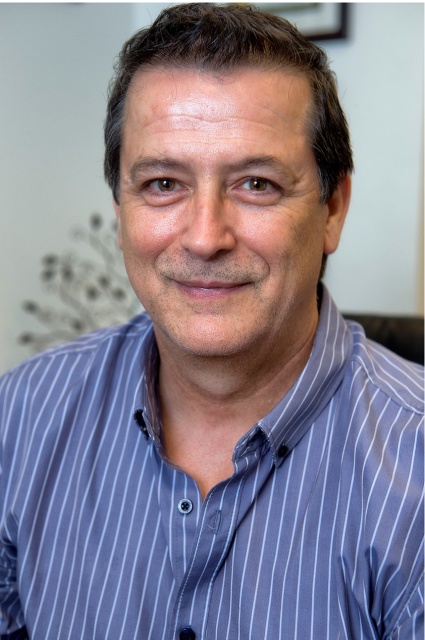By News and Internal Communications
RIO GRANDE VALLEY, TEXAS – FEB. 17, 2022 – Nearly two years ago, when COVID-19 made its way to the United States, we had to put our everyday lives on pause – including education.
Then, we adapted. We went about finding new ways of doing things. That is especially true for educators and their students.
At UTRGV, what started off as an extended Spring Break transitioned into more than a year of virtual learning. But due to the efforts of educational technologists, educators coped – some even say they thrived during the most challenging of times.
Dr. Rene Corbeil, UTRGV professor in the Teaching & Learning Department and program coordinator for the Master of Education in Educational Technology, said improving capabilities in online learning became a pressing matter when the pandemic arrived in March 2020.
“Everyone worked tirelessly to maintain quality education practices both at the university and within local school districts across the Rio Grande Valley,” he said. “Our education technologists became education’s essential workers. And our graduates – our former students – became first responders and jumped in to answer the call.”
“They volunteered their services,” Corbeil said. “They said, ‘Hey, how can we help? What can we do?’ Some were informed or we called them, but many just volunteered on their own.”
As soon as COVID-19 began shutting down schools, many of them began forming committees for immediate action and response.
“Schools created committees to ask, ‘How do we return when Spring Break is over?’ So many of our former students were invited to their committees to assist their regions.”
They were at committees in various school districts to identify the platforms, the learning management systems, the software, the hardware. The goals? To figure out a plan to re-open schools and finish out the school year. Often, they worked weekends and evenings to find solutions, Corbeil said.
UTRGV graduate students were prepared for just such an event, though, because they could put into use the new methods and technologies – like social media – they already had learned that would help educators adapt in a new age of teaching, he said.
“Some of our past graduates took to social media and started doing professional developments through Facebook Live, YouTube, and through all different types of apps and platforms, to teach teachers how to use very simple, low-threshold tools to work with their students,” he said.
UTRGV’s educational technologists donated their time and efforts to be the essential support the Valley’s education community needed, during what would turn out to be a protracted time of online learning, Corbeil said.
“I’m so proud and grateful to those whose work had such a positive impact on our community. It was gratifying to hear that our students not only found value in what they were learning, but also that they were making a difference in their communities.” Corbeil said. “They had an impact – from their classes and their classrooms to their schools and school districts.
“Our UTRGV students are what make this program shine,” he said. “They have been first responders in education during this pandemic.”
SPRINGING INTO ACTION
Alfonso Mendoza, now a UTRGV doctoral student and a 2019 graduate of the UTRGV educational technology program, has been an instructional technologist with Sharyland Independent School District for 15 years.
Currently in his second year as a doctoral student in Curriculum Instruction with a specialization in Educational Technology, he has seen multiple changes in teaching methods and platforms – and he welcomes many of those changes.
When in-person learning was put on hold, Mendoza became one of the first to reach out to help local school districts. Fresh on the heels of his 2019 graduation, Mendoza found himself on the front lines of online learning – a position that officially designated him as an essential worker in education.
“With the skills that I learned within the program at UTRGV, and the skills I already had, it really just allowed me to turn on the switch and go,” he said.
As the COVID-19 virus spread around the nation, Mendoza was prepared.
“That week when everyone was going on Spring Break, I didn’t have one,” he said. “Immediately, I began trainings on all our platforms. I would do two trainings a day, and that continued for about a month.”
Mendoza had a total of 125 trainings that introduced new ways of learning, by teaching educators how to continue their work in online platforms. Much of that included harnessing the power of technology through outreach on social media.
“I am a big proponent of professional development through the use of social media, specifically Twitter,” Mendoza said. “What I love about Twitter that I share with teachers is, if you get on the app and follow educational leaders in the RGV and other states, you’ll begin to see the immense resources that are shared there.”
Sending a simple Tweet with a hashtag can be a massive tool and resource for teachers, he said.
“Twitter can help teachers gain lessons, so they don’t have to restart from scratch,” he said. “They can take that information and see what may or may not work in their curriculum, but add to what will work into their existing lessons. And the connections you make on this platform can provide all new, global perspectives.”
Mendoza has high hopes that the progress in this new phase of educational instruction will become part of the new normal.
“My biggest fear is they’re going to go back completely to the way things were,” he said.
NOW
Asked if his biggest fear came to fruition as time passed, Mendoza sighed.
“Yes, the ‘big fear’ became a reality,” he said. “It wasn’t a lot of teachers who went back, but it was mostly the veteran teachers who were fighting to go back to 2019.
“But with this new reality, where there’s constant change, there needs to be a balance. So, my mission is to show teachers how you can still blend these two worlds,” he said.
To help blend those worlds, Mendoza hosts his own Podcast, called “MyEdTech.life,” where he talks about various subjects regarding education technology.
“I’ve got followers as far away as Australia and India, but mostly in the UK, and I’ve met wonderful educators from those regions,” he said.
MyEdTech.life is available on multiple media streaming platforms such as Spotify, Apple Podcasts and YouTube.
ABOUT UTRGV
The University of Texas Rio Grande Valley (UTRGV) was created by the Texas Legislature in 2013 as the first major public university of the 21st century in Texas. This transformative initiative provided the opportunity to expand educational opportunities in the Rio Grande Valley, including a new School of Medicine and a School of Podiatry, and made it possible for residents of the region to benefit from the Permanent University Fund – a public endowment contributing support to the University of Texas System and other institutions.
UTRGV has campuses and off-campus research and teaching sites throughout the Rio Grande Valley including Brownsville (formerly The University of Texas at Brownsville campus), Edinburg (formerly The University of Texas-Pan American campus), Harlingen, Weslaco, McAllen, Port Isabel, Rio Grande City and South Padre Island. UTRGV, a comprehensive academic institution, enrolled its first class in the fall of 2015; the School of Medicine welcomed its first class in the summer of 2016, and the School of Podiatric Medicine in the fall of 2022.


